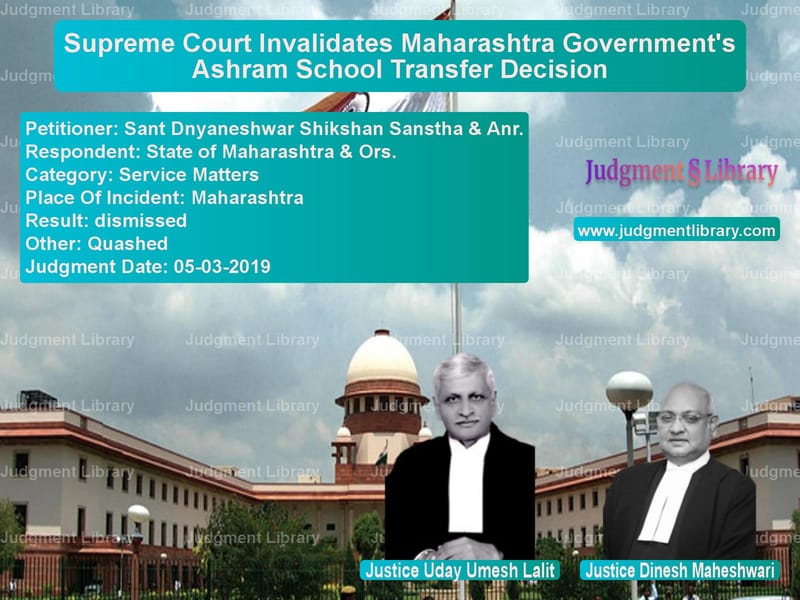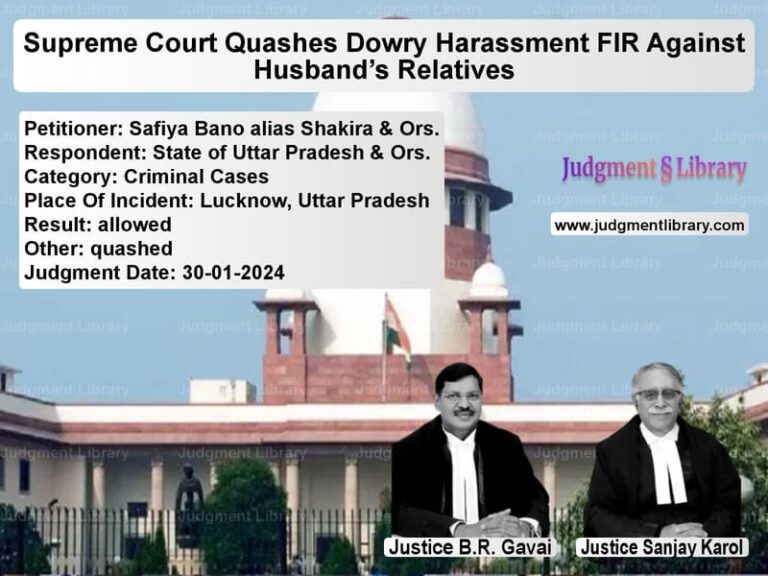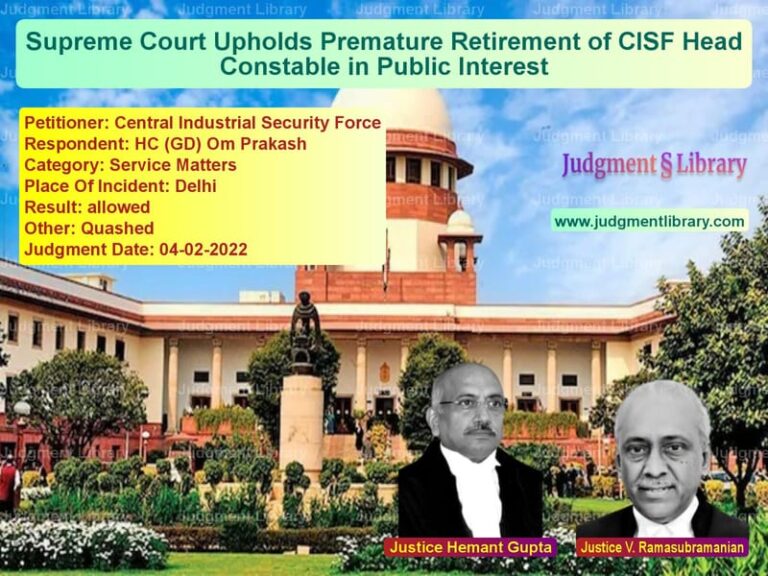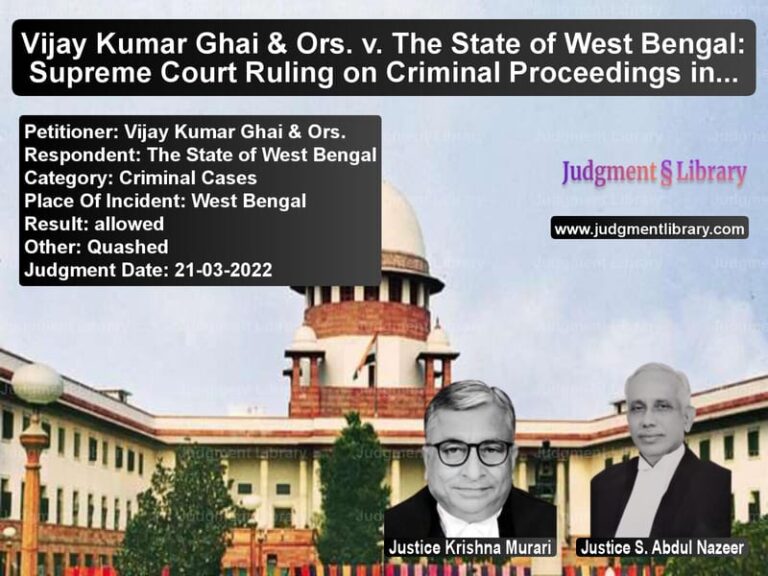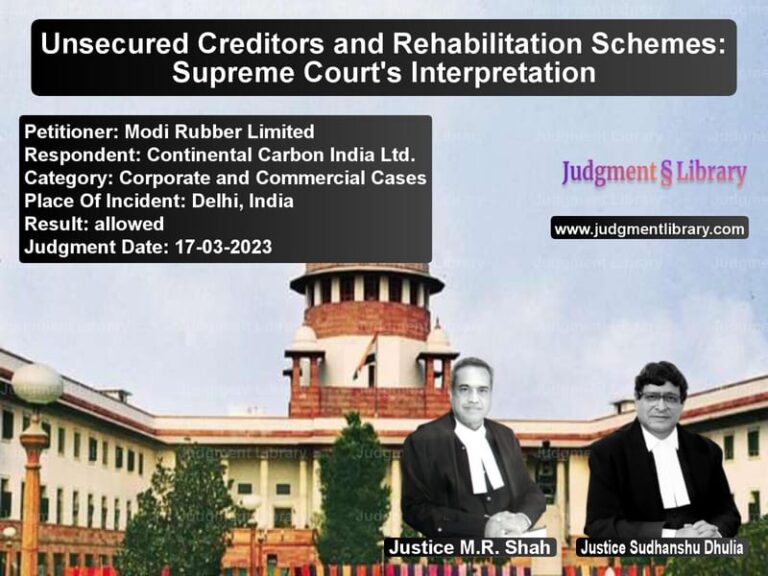Supreme Court Invalidates Maharashtra Government’s Ashram School Transfer Decision
The Supreme Court of India, in the case of Sant Dnyaneshwar Shikshan Sansthan & Anr. vs. The State of Maharashtra & Ors., ruled against the Maharashtra Government’s decision to transfer a closed Ashram School’s recognition to a new entity. The case raised critical legal questions about the arbitrary transfer of school recognition and the treatment of employees who were affected by the closure.
The judgment highlights the importance of following a transparent selection process when transferring educational institutions and sets a precedent ensuring that school recognition is not treated as a mere license transferable at will.
Background of the Case
The dispute arose when the Maharashtra Government decided to withdraw recognition from Prabodhankar Thakare Prathmik Ashram Shala, a school in Jalgaon, due to deficiencies in infrastructure and operational irregularities. Following this, on August 23, 2010, the school was closed, and students were absorbed into nearby institutions.
Subsequently, a government resolution (GR) issued on January 2, 2012, transferred the closed school’s recognition to Sant Dnyaneshwar Shikshan Sanstha, an educational institution based in Sangli, approximately 400 km away. This decision was challenged by the displaced employees who had been absorbed into other schools following the original school’s closure.
The affected employees approached the Bombay High Court, which quashed the government’s decision and directed that employees be retained in their existing institutions. Dissatisfied with the ruling, Sant Dnyaneshwar Shikshan Sanstha and the Maharashtra Government appealed to the Supreme Court.
Arguments by the Petitioner (Sant Dnyaneshwar Shikshan Sanstha & Anr.)
The petitioners contended that:
- The Maharashtra Government was within its rights to transfer the Ashram School’s recognition to a new entity.
- Their institution had the necessary infrastructure and was capable of providing quality education.
- There was no fundamental legal requirement mandating a transparent selection process for such transfers.
- The High Court’s decision was erroneous as it failed to consider the government’s discretion in making policy decisions.
Arguments by the Respondents (State of Maharashtra & Affected Employees)
The respondents, including displaced employees, argued that:
- The transfer of recognition violated fundamental principles of transparency and fairness.
- Recognition of a school is not akin to a business license that can be transferred at will.
- Employees who had been previously absorbed into other institutions should not be displaced again.
- The government failed to follow a fair and transparent process before deciding on the transfer.
Supreme Court’s Observations
The Supreme Court made the following key observations:
- The government’s decision lacked transparency, as there was no public notification inviting applications from interested institutions.
- School recognition is not a transferrable license but a grant based on specific educational requirements.
- The affected employees had already been relocated and could not be displaced arbitrarily.
- Previous judgments, including Jeevanjyoti Krida and Shikshan Prasarak Mandal vs. State of Maharashtra, had established that derecognized schools should not have their recognition transferred to other institutions without a proper process.
The Court stated:
“Recognition of an educational institution is granted based on the availability of requisite infrastructure and fulfillment of statutory norms. It is not a transferable entity that can be allocated to another institution at the government’s discretion.”
Final Judgment
The Supreme Court upheld the High Court’s ruling and issued the following directions:
- The January 2, 2012 Government Resolution transferring the Ashram School’s recognition to Sant Dnyaneshwar Shikshan Sanstha was quashed.
- The affected employees were to remain in their existing positions and be treated as in continuous service.
- The Maharashtra Government was directed to formulate clear guidelines for the transfer of school recognition.
- The state was required to ensure that displaced students continued their education without disruption.
The Court further directed:
“The government must adopt a fair, transparent, and competitive process before transferring the recognition of any derecognized institution.”
Conclusion
This judgment is a landmark ruling ensuring that government decisions related to educational institutions are made with due diligence and transparency. The Supreme Court’s directive safeguards the interests of both students and employees while reinforcing the principle that educational recognition cannot be treated as a commodity for discretionary transfers.
Petitioner Name: Sant Dnyaneshwar Shikshan Sanstha & Anr..Respondent Name: State of Maharashtra & Ors..Judgment By: Justice Uday Umesh Lalit, Justice Dinesh Maheshwari.Place Of Incident: Maharashtra.Judgment Date: 05-03-2019.
Don’t miss out on the full details! Download the complete judgment in PDF format below and gain valuable insights instantly!
Download Judgment: Sant Dnyaneshwar Shi vs State of Maharashtra Supreme Court of India Judgment Dated 05-03-2019.pdf
Direct Downlaod Judgment: Direct downlaod this Judgment
See all petitions in Employment Disputes
See all petitions in Recruitment Policies
See all petitions in Public Sector Employees
See all petitions in Judgment by Uday Umesh Lalit
See all petitions in Judgment by Dinesh Maheshwari
See all petitions in dismissed
See all petitions in Quashed
See all petitions in supreme court of India judgments March 2019
See all petitions in 2019 judgments
See all posts in Service Matters Category
See all allowed petitions in Service Matters Category
See all Dismissed petitions in Service Matters Category
See all partially allowed petitions in Service Matters Category

